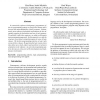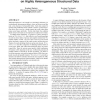116 search results - page 20 / 24 » Intentions: a game for classifying search query intent |
IRFC
2011
Springer
12 years 11 months ago
2011
Springer
Search engine result pages (SERPs) are known as the most expensive real estate on the planet. Most queries yield millions of organic search results, yet searchers seldom look beyon...
CIKM
2011
Springer
12 years 7 months ago
2011
Springer
Traditional information retrieval techniques based on keyword search help to identify a ranked set of relevant documents, which often contains many documents in the top ranks that...
ESWA
2002
13 years 7 months ago
2002
In current-day software development, programmers often use programming patterns to clarify their intents and to increase the understandability of their programs. Unfortunately, mo...
WEBDB
2010
Springer
14 years 17 days ago
2010
Springer
Wikipedia infoboxes is an example of a seemingly structured, yet extraordinarily heterogeneous dataset, where any given record has only a tiny fraction of all possible fields. Su...
CIKM
2009
Springer
14 years 2 months ago
2009
Springer
Understanding intents from search queries can improve a user’s search experience and boost a site’s advertising profits. Query tagging via statistical sequential labeling mode...


